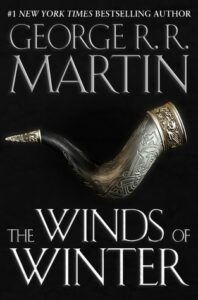This weekend, I saw George R.R. Martin’s post about the next book in his series, The Winds of Winter, apologising for further delays to the deadlines and explaining what’s going on. You can find that here. Not shockingly, I have opinions on this.
I’m a freelance writer. I have deadlines and they’re pretty set in stone. I have to get up and go to the computer no matter how I feel when there’s a deadline coming up, or there’ll be a pena lty: bad feedback, no re-employment, cuts in pay. If I have copy to write, I don’t get to run out of ideas. If I say I’ll deliver an article on a topic, I can’t change my mind (at least not without consulting my client, and being prepared to deliver the article I originally pitched anyway). When I’m ghostwriting, I don’t get the luxury of saying that the inspiration isn’t there. It’s as stark as that: I don’t deliver, I don’t get paid.
lty: bad feedback, no re-employment, cuts in pay. If I have copy to write, I don’t get to run out of ideas. If I say I’ll deliver an article on a topic, I can’t change my mind (at least not without consulting my client, and being prepared to deliver the article I originally pitched anyway). When I’m ghostwriting, I don’t get the luxury of saying that the inspiration isn’t there. It’s as stark as that: I don’t deliver, I don’t get paid.
So I totally feel the argument that if you commit to deadlines, you should deliver by the deadlines or face the consequences.
Thing is, for me, the consequences aren’t a horde of angry fans with whom I have no contract, no agreement, no protection. The consequences are between me and my employer, and possibly potential future employers. There are rules which govern the way I interact with my clients, and if they break those rules, I have recourse.
Not so much for Martin. He’s got this big amorphous group of fans who he is palpably worried about upsetting, in addition to his publishers. And it’s fandom, which has proved itself fully capable of all kinds of insanity in revenge for slights real or imagined. I wouldn’t want to be the person sorting through his email inbox: I’m willing to bet there’s abuse, threats, all sorts, because this has just got that big.
But look. He owes his readers nothing.
There’s no contract binding him to entertain them at their command. He no doubt has a contract to deliver the work to his publisher, who will have given him an advance, and they’re the only ones who have any right to hold him to a deadline. The deadline argument is a fair enough one to make… if you’re his publisher.
If you’re not, then please consider this: you’re adding additional pressure. As well as having to negotiate with his publisher, with HBO, with anyone else who has a financial stake in the books, now Martin has to be his own public relations department. And speaking from experience, having even one person chasing you up for work sucks your energy, your motivation, your time. Nobody is actually sanguine about missing deadlines. We know there are consequences.
I would be willing to lay money that the additional fan pressure, the constant speculation that he’ll die before finishing the books, the rumours that he hasn’t written anything… that all of that is contributing to making it more difficult for Martin to write, not less. That all this pushing and shoving is hindering progress.
This isn’t about financial consequences, it’s a sense of entitlement. False entitlement. Authors don’t owe us new books on a regular basis. Leave the consequences to the publishers — as fans, we should surely support the authors instead of adding more resistance.
Obviously, supporting the authors can include wanting to read their next book, being excited about it, being disappointed when it’s not going to come out on time. But authors are people and have lives, and we’re not their employers. Personally, I would rather my favourite authors be okay, be satisfied, and write good books, than deliver to a deadline.
